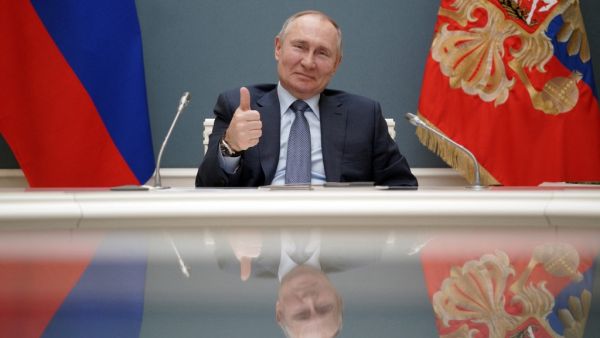Russia appears to be in a geopolitical position much like the one previously defined by the Soviet Union.
The Communist party inherited a strategic position from the Tsarist era after the Bolshevik revolution.
The same position was then inherited by Russia from the former Soviet Union. The main difference is that of leadership: What do you do with all the geographic strength in the face of existential challenges with the West, whether you are an ideological communist or a Russian patriot who wants his country to garner the position it deserves in the world?
The leaders of the Bolshevik revolution, Vladimir Lenin, Joseph Stalin and Leon Trotsky, knew exactly what they wanted from their state when they inherited the Tsarist regime in 1917. Boris Yeltsin was a drunkard who did not know what he wanted from the Russian state he carved out of the Soviet Union during its disintegration in 1991.
The awesome cost of rebuilding Syria. Whether the sum needed is $900bn or even more, the likelihood of raising the capital is pretty slim. https://t.co/uD9UITiQ5b
— arn (@arnorton) April 22, 2017
But his heir, Vladimir Putin, knew exactly what he wanted. The geopolitical situation of Russia, if not exploited and channeled into power, would be lost as the superpower status of the Soviet Union was lost. On more than one occasion, Putin wanted to issue reminders of Russia’s power, and he succeeded in that. Such was the case in Crimea and Syria, and it is now the case in the Eastern Mediterranean. There, he finds today an opportunity to access the gates of the Gulf region that were ignored by successive American administrations. He found the gates open for him.
Just as he sensed a strategic opportunity in Crimea, he has now realised that there is a strategic opportunity in the Gulf.
One of the main flaws of the former Soviet Union was its hesitation at the height of its power. It deployed nuclear missiles in Cuba first and believed that the United States would not notice. Then, its leader Nikita Khrushchev decided to withdraw after an American blockade and threats from President John F. Kennedy, which brought the world to the brink of nuclear war. It sent fighter squadrons deep into Egyptian territory during and after the war of attrition with Israel. The jet fighters were piloted by Russian officers because the Egyptian pilots had not completed their training on advanced MiGs after their air force was destroyed on the ground during the 1967 war. But the Soviet Union imposed on its pilots a complete radio silence so that the Israelis would not “discover” that the Russians were taking part in the war.
It is intriguing that a great power would fear a country like Israel. Signs of the ageing of the Soviet leadership began in the 1960s, not in the 1980s, as is commonly believed. Communist leader Leonid Brezhnev was a symbol of inertia, but he was not the only symbol. Politburo formations ran in succession over a short period of time until Mikhail Gorbachev came to power and completely killed the idea of the Soviet Union.
Vladimir Putin witnessed all this the day the Berlin Wall collapsed. He was then a mid-ranking intelligence officer in Berlin. If the prestige of a great power is lost, everyone will dare to assail it. It started with the mujahideen in Afghanistan, and ended with protesters in Eastern Europe.
Today, Russia is aware of the magnitude of the strategic gaps left in the region by the United States in particular and the West in general. And it is more than ready to fill the gaps.
Russia is not shy about sending its strategic fighters and bombers to strike targets in Syria and turn the balance of war in its favour. It does not matter if it is a just or dirty war. Why? Because at stake is unrestricted access to the Mediterranean offered with this strategic opportunity.
From the Hmeimim air base and the naval base in Tartus, the Russians overlooked the Eastern Mediterranean. The loss of a fighter plane shot down by the Turks allowed Putin to ensure Turkish President Recep Tayyip Erdogan’s compliance, and transform the nature of the relationship between them strategically. Through the Turks, the Russians began to dismantle military relations within NATO and sell advanced Russian weapons with a tangible espionage dimension tied to the second largest army in the Atlantic alliance. The S-400 missiles are now, or will be, part of NATO’s defence system, and with them there is more than a Russian expert helping train the crews and operate the systems. Russian “experts” are within the NATO loop of information.
The Eastern Mediterranean is a flexible notion. It reaches the shores of Tunisia and Italy. By a leapfrog, Putin was in Libya. He learned the lesson of the mercenaries from the United States. “You have Blackwater and I have the Wagner Group.” Where he could not send the army, Wagner did the job. And any day he did not like the arrangements, the company could withdraw without political or diplomatic repercussions. Mercenaries were created to commit violations with impunity as the Blackwater experience has taught us.
Putin had been waiting for the situation in the Gulf to ripen quietly. There was George W. Bush’s war and its deconstruction of Iraq. Then Barack Obama toyed around with the idea of democracy during the “Arab Spring” and the chaos that followed. Then there were the Donald Trump jolts. Finally, Joe Biden came into the picture as a new American president targeting moderate Gulf powers, especially Saudi Arabia.
The Gulf has historically been reluctant to replace its relationship with the West with non-Western ties. The West is a complete package, including weapons, protection, culture, trade and an oil market. But can the Gulf be blamed today for relinquishing its adherence to the West?
The West has left the Gulf and not the other way around. The West has left the Gulf at a dangerous juncture during which the region faces existential threats from Iran. Adding fuel to the fire, the US administration waged a media smear campaign against Saudi Arabia barely a month after gaining office.
Moreover, a mix of alternatives is available. Advanced weapons from Russia, goods from China, exceptional industrial technology from countries like South Korea capable of building better nuclear plants than those constructed by the US, services from India and more recently, Israeli information technology that the United States itself buys from Israeli companies.
The Chinese, Indian and Korean leaders moved early, while the Russians waited and the Israelis imposed themselves by virtue of the Iranian challenge.
Russian Foreign Minister Sergei Lavrov’s recent tour is a continuation of the gradual strategic entry into the Gulf. If Turkey establishes bases in the Gulf and acts as if it were a Gulf state with full rights through the Qatari gate, then why doesn’t Putin’s Moscow act with the same mindset? What Biden loses in the Gulf, Putin gains.
This article has been adapted from its original source.








